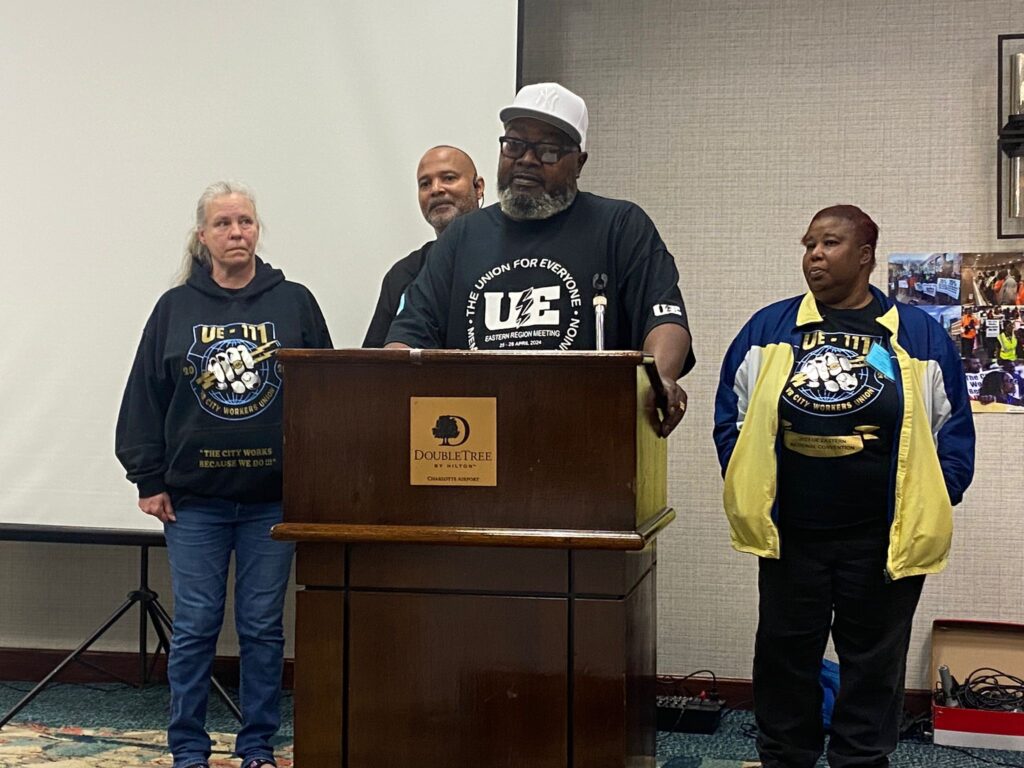
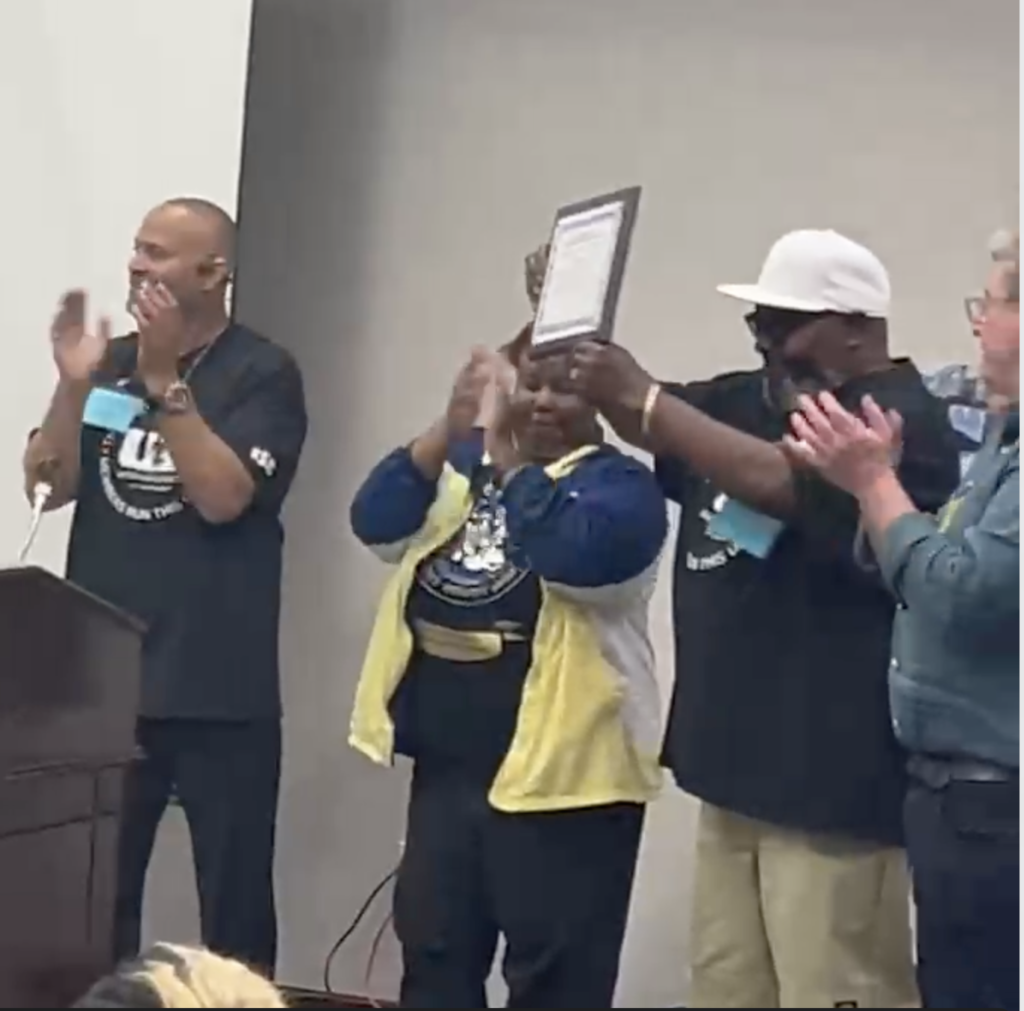

A People’s Hearing
Immediately after Floyd McKissick, a utilities commission member, opened the Duke Energy Carbon Plan Public hearing, BWFJ member Bobby Jones interrupted by denouncing it as a farce, being in partnership with Duke Energy, and their continual betrayal of the people. “I’m walking out, and we’ll be holding a real hearing outside for anyone that wants to join us,” he said. Joined by several others who did something similar, they proceeded outside and joined by others for a people’s hearing in the “Good Fire” context.
People’s Campaign Against Massive Electric 39-73% Hikes
Before the hearing, the people held the “Rally Against the Duke Energy Carbon Plan”, a plan that few people like, except for Duke Energy. The projected construction costs for these projects would result in a staggering 39% and 73% increase in average monthly energy bills for Duke Energy Progress residential customers and Duke Energy Carolinas customers, respectively. This will continue to be a heavy burden for all ratepayers, especially those who labor for minimum wage, underscoring the urgent need to oppose this plan.
The April 30 rally was MC-ed by Karen Bearden from 350 Triangle and featured speeches from Dr. Crystal Cavalier-Keck from 7 Directions of Service, Caroline Armijo of The Lilies Project, Rania Masri from NC Environmental Justice Network, and Bobby Jones. The group, the Raging Grannies, performed, inspiring the audience with their powerful messages and underscoring the importance of community mobilization in our fight against Duke Energy’s carbon plan.
Duke Tries to Buy Off the Black Church
“Duke Energy’s carbon plan “community outreach” efforts have aimed the long barrels of their heavy artillery war chest directly toward the bedrock of our community, “the Black Church”. In Goldsboro, NC, they targeted the First African Baptist Church, a historic and prestigious “Branch of Zion” by sponsoring an event that included a “barbeque plate and a light bulb” give-away. Then they went down the street targeting Rebuilding Broken Places, the Community Development Corp. for Greenleaf Christian Church, another historic and prestigious “Branch of Zion.” They were awarded a $25,000 grant at a media event on ‘Earth Day, ‘ said Bobby at the People’s Rally.
Are these efforts to help our community, or are they efforts to erode the moral fabric that undergirds the foundation of our church and our community, as [it has] so successfully done to our legislators? We say no, not on our watch! Get out of our community with your extractive mindset! If you desire to come back, bring a different mindset, and yes, PLEASE BRING AN UNSELFISH HEART!

An immediate ceasefire in Gaza between Israel and Hamas.
Working people around the world have mourned the tragic loss of life in Israel and Palestine since Hamas’s brutal attack in Israel on October 7, 2023. As trade unionists, we stand in solidarity with workers everywhere and join in movements leading towards a just and peaceful world, which upholds our values of democracy, equality, and respect for human and labor rights.
The ongoing tragedy in Israel and Gaza makes the prospects of a just and peaceful world more remote.
Our unions are united in our call for a ceasefire in Gaza. To achieve a just and lasting peace, the bombing must stop, the hostages must be released, and the humanitarian aid that is so needed in Gaza must be realized.
Together, we have formed the National Labor Network for a Ceasefire. We stand for peace, justice, and a better future for working people everywhere.
Our unions comprise educators and electric workers, tradespeople and transportation workers, autoworkers and flight attendants, nurses and care workers, postal workers and public servants, and many more.
American unions that have called for a ceasefire now represent the majority of the organized labor movement.
Unions and union members! Sign on to join the U.S. labor movement and call for a ceasefire in Israel and Palestine.
Link to sign the call for an immediate ceasefire in Gaza. – https://www.laborforceasefire.org/
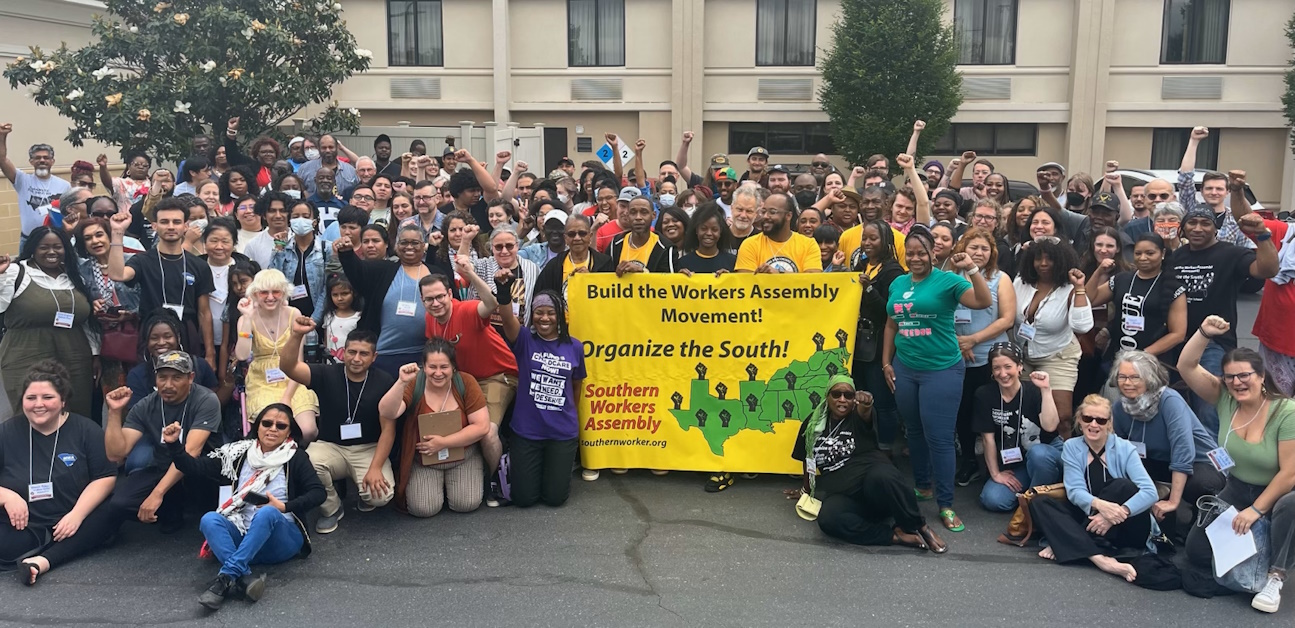
The Southern Workers 2024 Organizing School focused on steps to build workers’ assemblies and “salting” or recruiting pro-union workers to the new auto branch plants coming into the South.
The Southern Movement Assembly is a formation of community organizations, and people’s assemblies committed to building people’s democratic assemblies across the South. It works parallel to the Southern Workers Assembly. Shown are SMA member organizers from Tennessee and North Carolina who include workplace issues.
Southern MOVEMENT Assembly Members attend Southern WORKERS Assembly
The Southern Movement Assembly is an organizing process and a convergence space that centers the voices and experiences of grassroots leadership on multiple frontlines. Organizations coordinate actions locally and regionally to confront poverty, racism, and violence and to build political power in our communities. The Assembly is a movement governance process combining political education, discussion, planning, action, and synthesis.
“We heard from the rail workers. We heard from the truckers. We’ve got the longshoremen in the house, too,” said Leonard Riley, a longshore worker with the International Longshoremen’s Association (ILA) Local 1422 and member of the SWA Coordinating Committee, addressing a packed house at the Teamsters Local 71 union hall during the opening program of the 2023 Southern Worker School.
“The reason I bring that up is because of the power that’s in this room. We’ve got bus drivers over there, teachers over here. There’s power in this room. It’s going to take strategy, planning, coming together, and finding out where the power connectors are to mobilize and exercise it.”
Strategizing, planning, building networks, and engaging in collective discussion on how to build a stronger and broader workers movement – including local workers assemblies – in the U.S. South is exactly what the more than 120 rank and file workers and other activists who participated in the worker school during the weekend of April 21 – 23 in Charlotte, North Carolina, did.
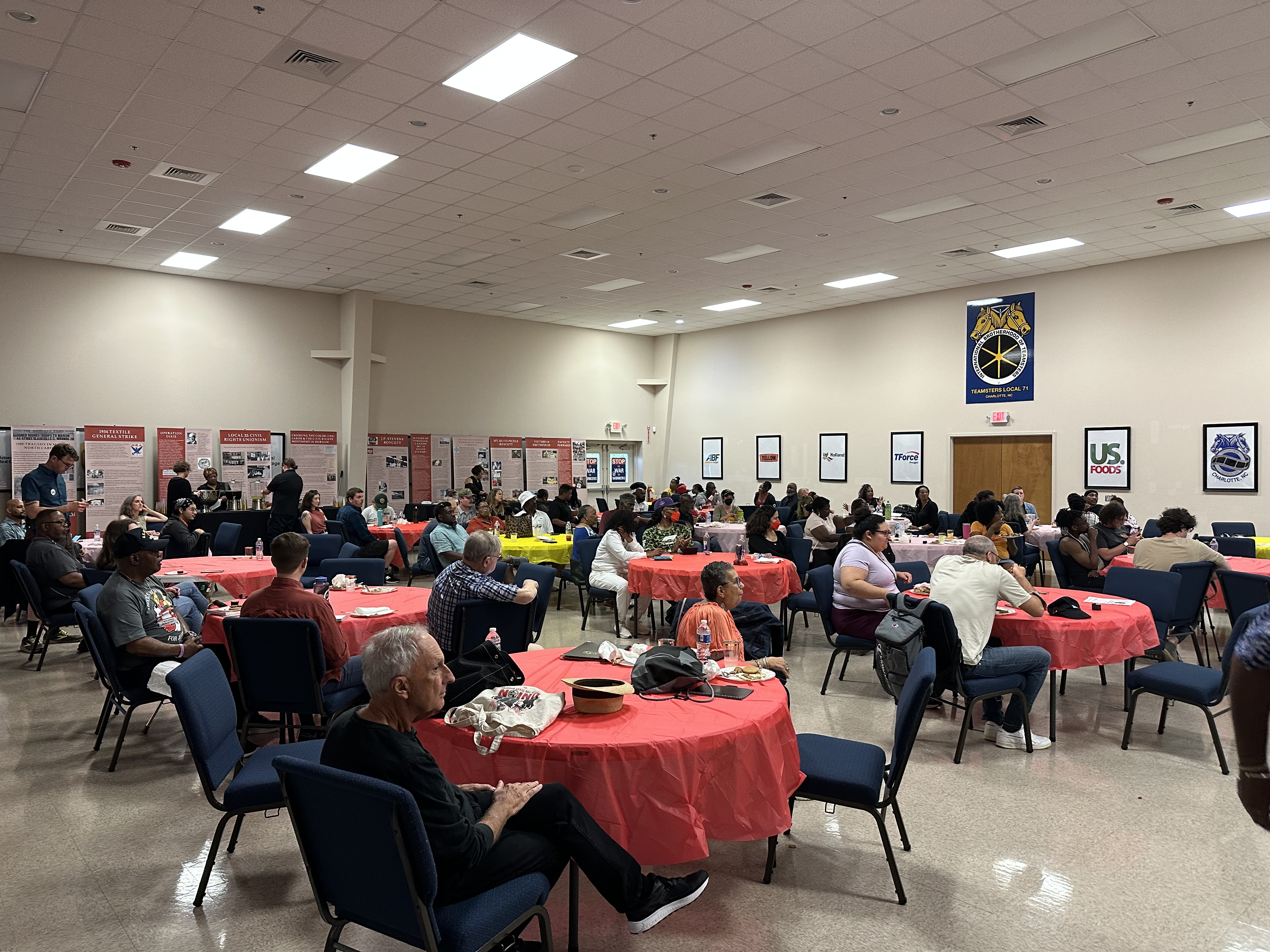
The crowd at Teamsters Local 71 for the opening program, Southern Workers on the Move.
Workers who participated in the gathering came from nine Southern states – South Carolina, Tennessee, North Carolina, Virginia, West Virginia, Maryland, Georgia, Florida, Kentucky – and numerous sectors, including the service industry, logistics, education, the public sector, construction, and more. Notably, several worker organizations and other political formations sent delegations of their membership to participate in the convening, including the Union of Southern Service Workers (USSW), Railroad Workers United (RWU), the International Longshoremen’s Association (ILA) Local 1422, UE Locals 150 (NC) and 111 (Virginia Beach), Truckers Movement for Justice (TMJ), the National Black Food and Justice Alliance, the Emergency Workplace Organizing Committee (EWOC), the National Domestic Workers Alliance (NDWA) & We Dream in Black (WeDiB), and Black Workers for Justice, among others.
Even beyond the programming and discussions that took place throughout the weekend, the gathering was significant and reflected both quantitative and qualitative steps forward in the development of a South-wide network of militant, class conscious, rank and file workers engaged in struggle across various strategic sectors of the economy. The gathering had a strong multi-national character, helped to consolidate the work of existing workers assemblies and drew in workers and other forces who are interested in developing one in their city, and was the largest Southern Worker School held to date.
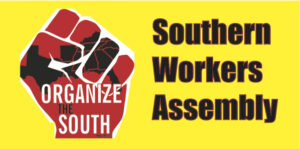
The worker school opened on the evening of Friday, April 21, with an exciting program – titled “Southern Workers on the Move” – featuring workers on the frontlines of struggle in mostly non-collective bargaining workplaces. The discussion began with opening greetings from Ashely Hawkins, president of the Charlotte Metrolina Central Labor Council, and Nichel Dunlap-Thompson, recording secretary for UE Local 150 and a leader in the Charlotte Workers Assembly. Ajamu Dillahunt, a member of the SWA Coordinating Committee and Black Workers for Justice, then opened the program by speaking to the political climate and the need for a social movement oriented workers movement in the South.
He was followed by reports and lessons from Mama Cookie Bradley from the Union of Southern Service Workers, Hugh Sawyer of Railroad Workers United, UE Local 150 Charlotte Chapter president Dominic Harris, worker organizer and former CLT4 (an Amazon fulfillment center in Charlotte) worker Dion Coutrier, and concluded by Sharon James with the National Domestic Workers Alliance.
“We are up against Precision Scheduled Railroading (PSR). They’re trying to run the price of the stock up, and then these hedge funds will sell out and leave a skelton left. It will lead to decimation that we’ll all end up paying for,” Hugh Sawyer told the crowd. “Railroad Workers United today is taking on the monumental task of public ownership of railroads… From an environmental point of view, you want healthy railways, and the only way we’re going to get it is through public ownership.”
A lively general discussion, sharing of other reports from workers present, and remarks on strategy and tactics for the period then followed.
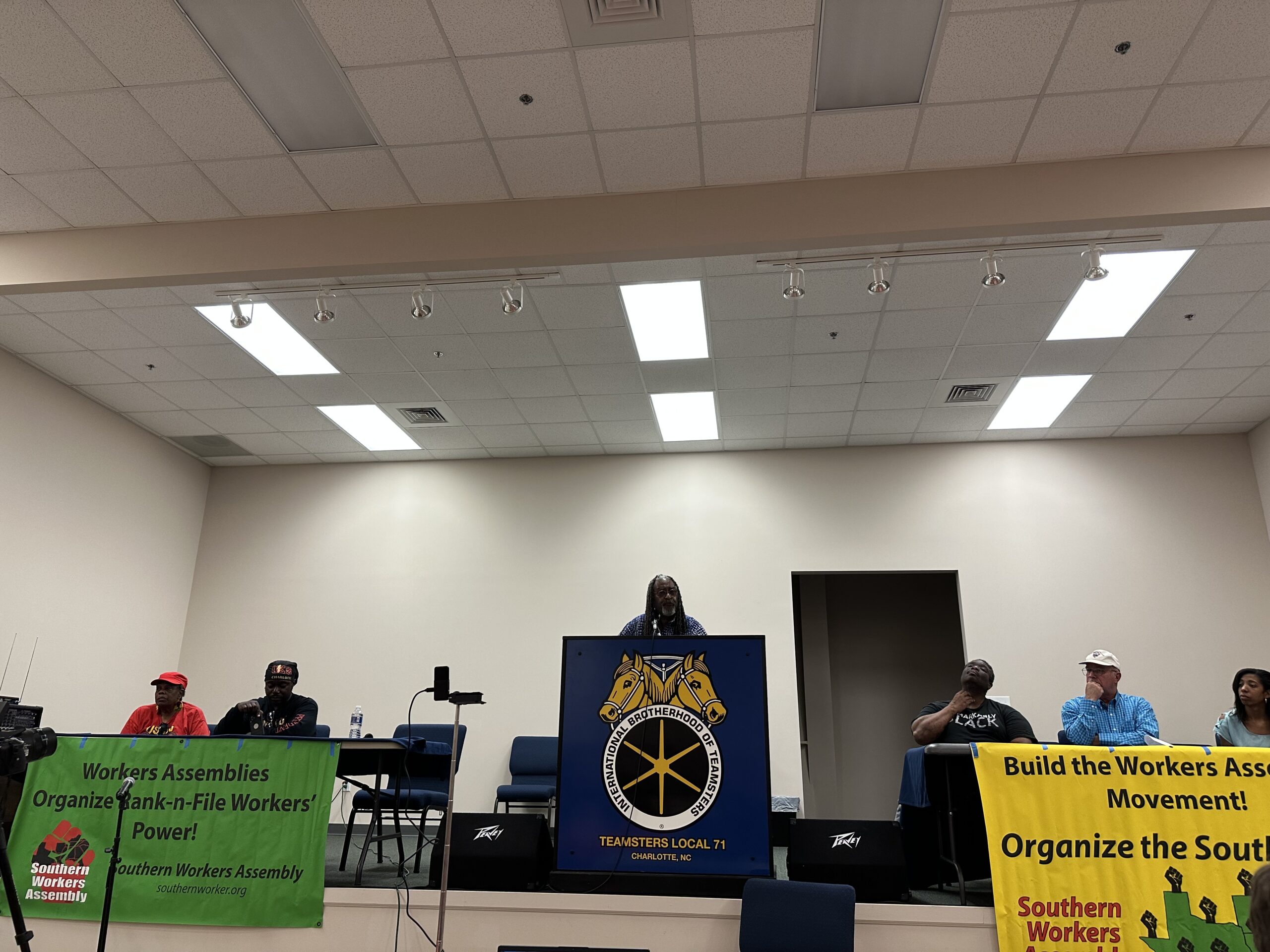
Speakers at the Friday evening program. (L – R) Mama Cookie Bradley, USSW; Dominic Harris, UE 150; Ajamu Dillahunt, SWA CC and BWFJ; Dion Coutrier, Amazon worker organizer; Hugh Sawyer, RWU; Sharon James, NDWA
“It’s clear to us that we’re in a crisis. The crisis is a crisis of capitalism, and it’s showing up in the economy, it’s showing up in politics, and it’s showing up in social relationships,” said Ajamu Dillahunt at the start of the day on Saturday. “It’s showing up in how they run us at work, it’s showing up in how they deal with our education system, it’s showing up in every aspect, and we’ve got to respond to that now in a unified way.”
Saturday’s session focused on putting forward a ten step methodology for developing workers assemblies, and began with an assessment of the conditions that informs this approach to developing a basic level of working class organization and struggle.
“There are 118 million private sector workers in the country. Last year only 65,000 participated in union recognition elections. By that math it would take 2,000 years to organize half of the working class. We have to move people to collective action despite prospects for government recognition,” stated Ed Bruno, member of the SWA Coordinating Committee, former UE Director of Organizing, and former National Nurses United Southern Regional Director. “It isn’t the election that gives us the union. The election gives us a ticket to the dance, the union is the dance. We need to be talking to workers in the beginning about work stoppages, picketing, and strikes. We need to start by workers realizing they can depend on one another, by doing it.”
Bruno continued, “We want to make the shop issue a public issue, it gives the boss a problem that he can’t bottle it up in his office. The question of maximizing our power is crucial, so we have to start to build networks of workers in strategic industries across the region. We did this in Texas, where there were no union hospitals, now there are 15. We didn’t start by organizing a union. We started out by organizing the National Nurses Organizing Committee in Texas, Florida, and Tennessee.”
This orientation on the need to build workplace organization that is anchored by the most conscious and active workers in different strategic workplaces – in other words, cadre that form a militant minority – that are then connected together in local and regional networks to coordinate and engage in public collective action provided the foundation for day and the overall approach to building workers assemblies. It was also emphasized how these workplace committees and networks should engage in taking up issues that can connect the workplace and the broader community, and particularly taking on fights against racism and other forms of oppression and placing a strong emphasis on the leadership of Black workers, to build a broader social movement oriented workers movement.
“We are looking to put together cadre in many workplaces. The first thing we have to do is go out and establish leaflet brigades to leaflet workplaces all over the South,” said Libby Devlin, a member of the SWA Coordinating Committee and former National Bargaining Director for National Nurses United.
Discussions throughout the day raised how to form leaflet brigades, how to identify significant workplaces to focus outreach efforts around and best practices for that work, how to have initial followup conversations and more focused organizing conversations, and how to connect workers from different workplaces together to form workers assemblies. Rank and file leaders from workers assemblies helped to lead each section, sharing their experiences and lessons from their work. Other workers at the school then had the opportunity to ask questions, to contribute their own experiences and lessons, and engaged in roleplays and other training activities to deepen their skills on the topic at hand.
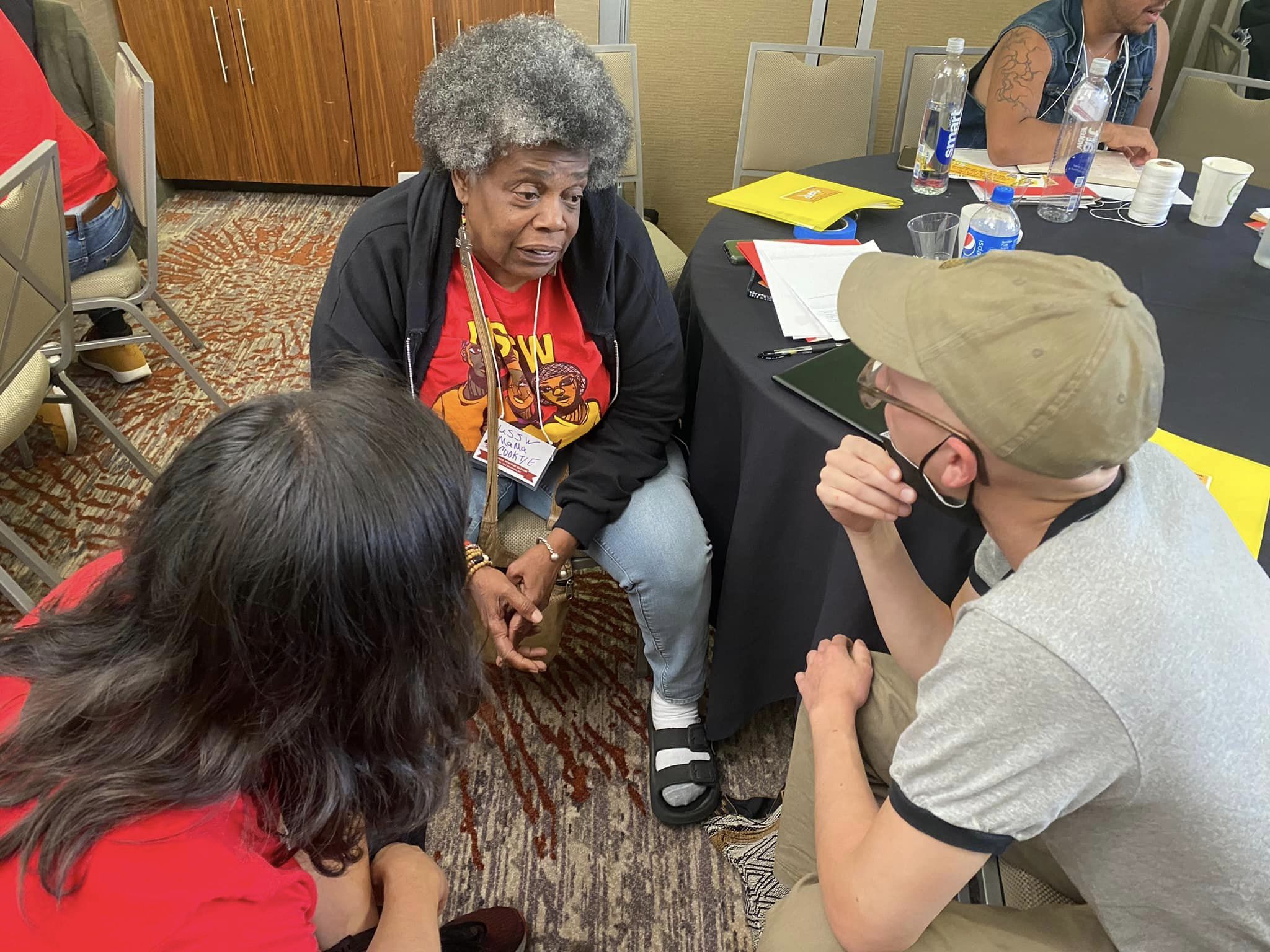
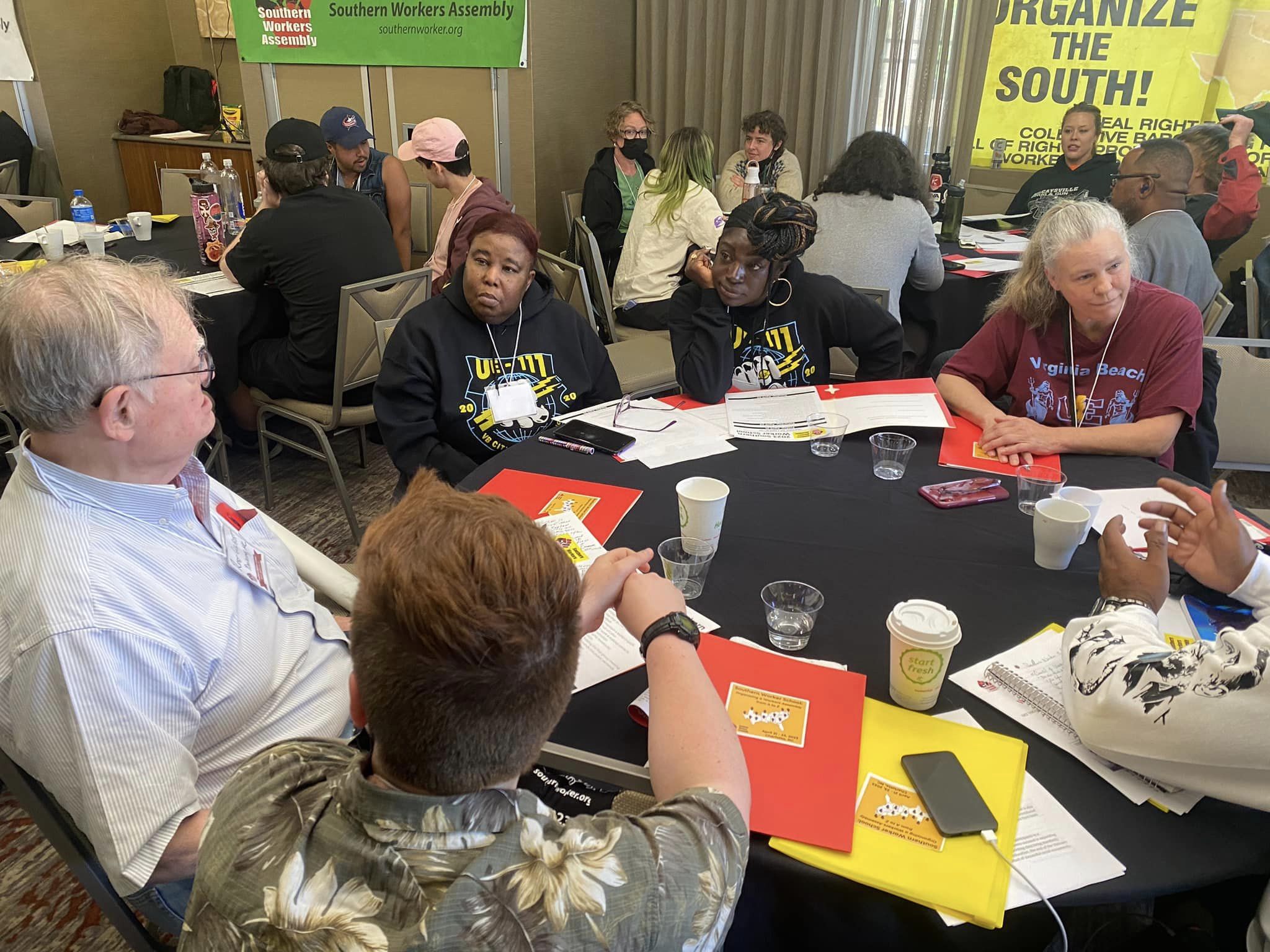
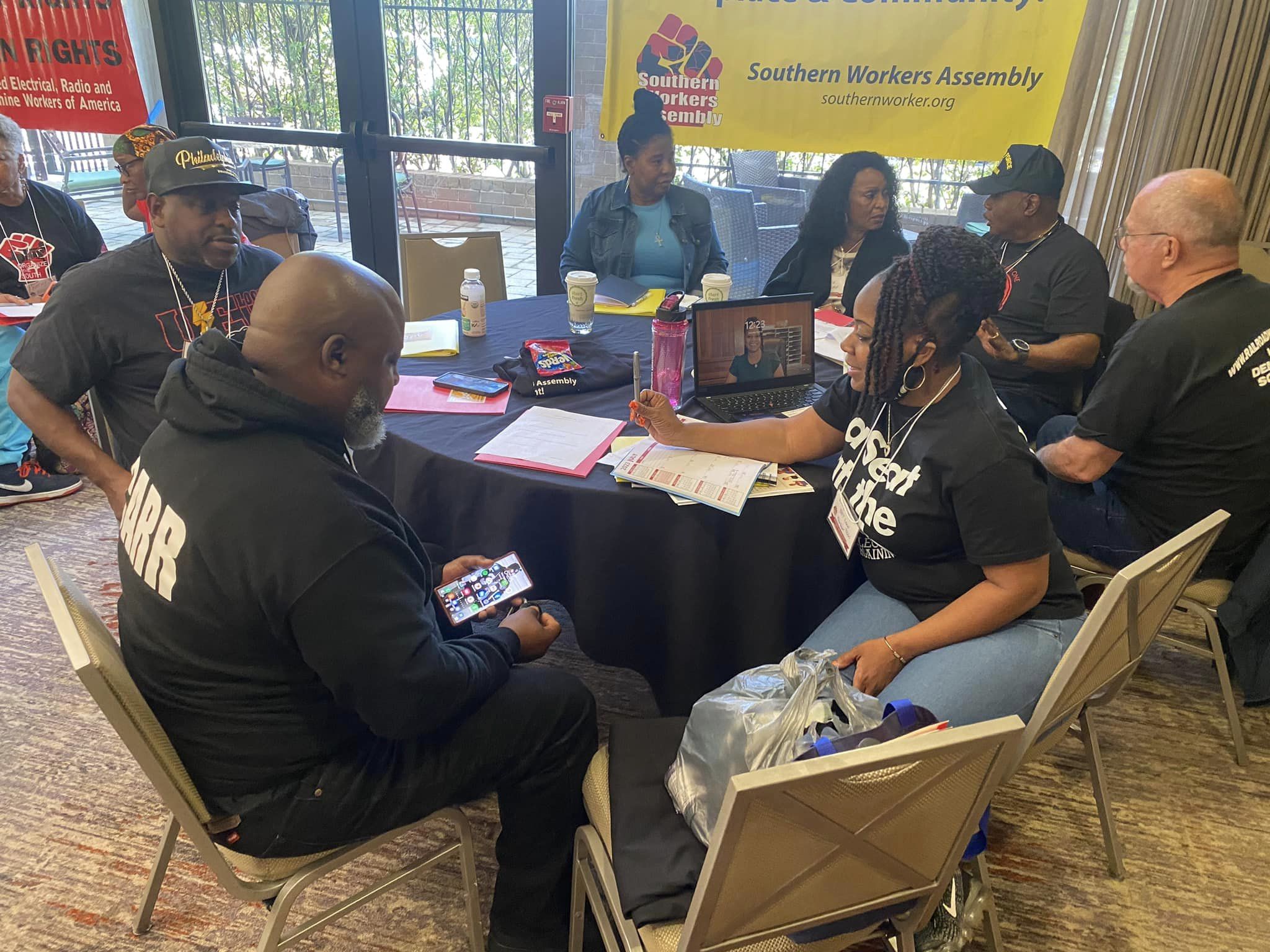
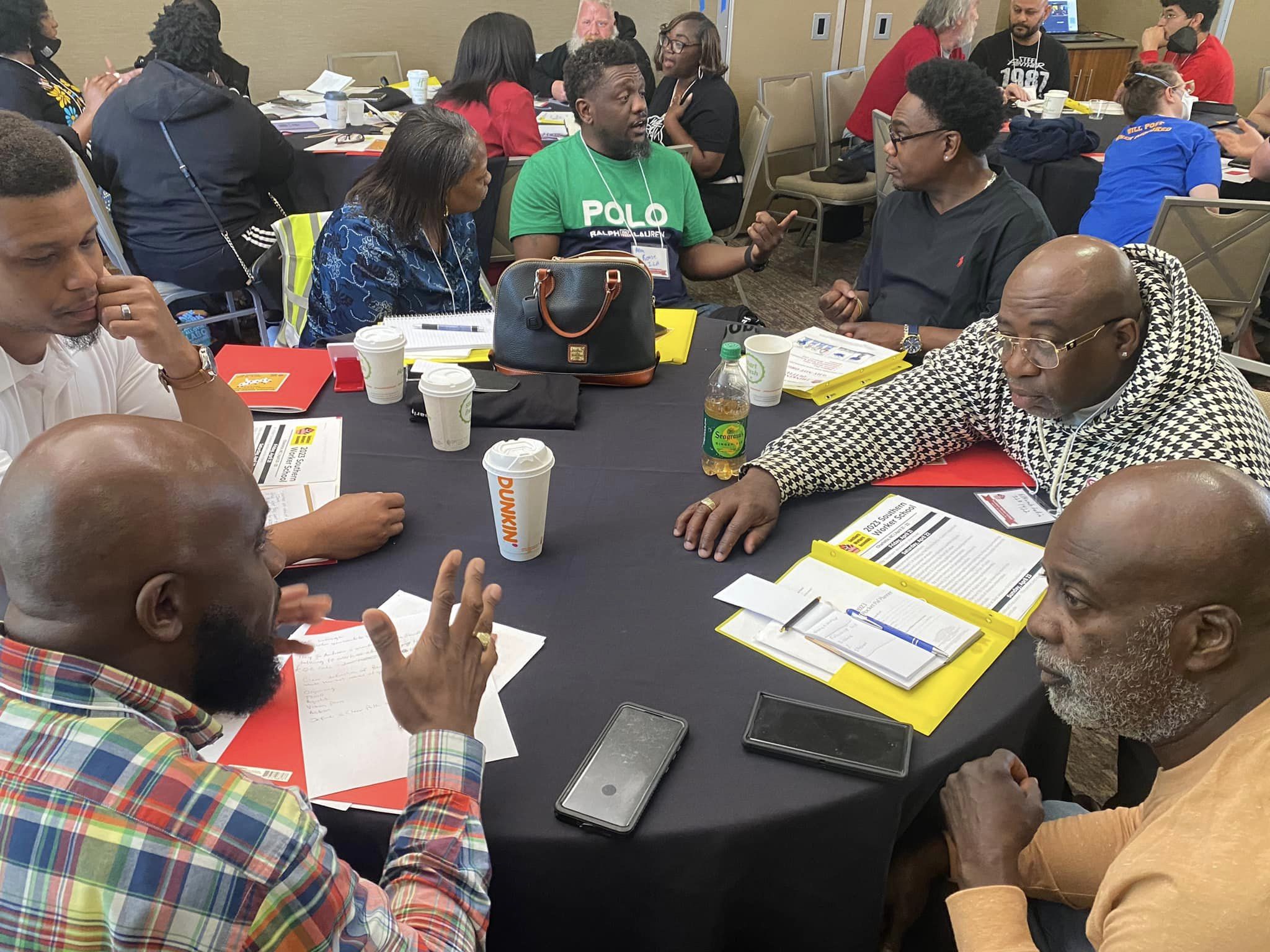
Small group discussions during Saturday’s session of the Southern Worker School.
“The worker school gave me the foundation for the movement, how it was started, what it takes to keep the work going, and the role of collective action and militancy. The training showed how to do outreach and recruit workers, and ways to keep the workers engaged in the organizing,” reflected Felicidad Bryant, a clerical worker from Virginia Beach, VA, who was previously a member of UE Local 111. “The exercise that made us replicate the workplace organizing conversations was really helpful. I do have more clarity now on how to identify sites for leafleting and I’m excited to bring that back to our work here.”
The Fruit of Labor Singing Ensemble contributed political narratives and cultural presentations throughout Saturday’s sessions.
The school concluded on Sunday with a political education session led by SWA Education Committee member Abdul Alkalimat. The presentation and subsequent discussion focused on laying out an assessment of developments in the capitalist economy in the U.S. and internationally, the growth of the right wing and attacks on oppressed and working class people, and the ramifications of these developments on our work.
“I really appreciated hearing the Fruit of Labor sing the song about ‘You don’t make a dime, unless we move.’ That was a powerful song because up until this past year when we moved to a strike vote with CATS, it was the first time in 20+ years of the drivers taking a stand for their rights and ready to strike,” noted Gia Lockhart, a Charlotte Area Transit System (CATS) operator. “I can’t wait until I can review the slides that were put up on Sunday by Abdul Alkalimat. I’ve already shared a few of them in our Facebook group that’s dedicated just to the workers.”
This was the first worker school held by the Southern Workers Assembly since the passing of co-founder Saladin Muhammad. Muhammad was acknowledged and honored throughout the gathering, and the delegation from the ILA Local 1422 presented a plaque in his honor during Saturday’s session, pledging their continued commitment to building the SWA.
Before his passing, Muhammad had raised a proposal for the formation of a Council of Workers Assemblies to institutionalize the various networks of workers coalescing within the SWA, to create a venue for workers from different assemblies or who are engaged in developing an assembly in their area to better exchange and coordinate their work across the region, and to bring forward more rank and file leadership of the SWA network.
The gathering in Charlotte advanced the development of such a council, with plans to convene the first meeting in June.
Expanding political education efforts, broadening outreach and leafleting efforts across the region, along with deepening the work of existing assemblies and supporting the development of new assemblies by workers who attended from areas that do not currently have an active workers assembly, are also high on the agenda in the months ahead. Videos and other materials from the worker school will soon be shared on the SWA website and disseminated throughout the network to additionally support these efforts.
In the midst of the deepening crises facing workers and oppressed peoples, alongside the growing flight of capital to the South to exploit labor and take advantage of the reactionary political climate and low level of working class organization, the worker school offered a framework and a strategy to fight back. It was, ultimately, a reflection of the motion of workers across various sectors and the role of the workers assemblies to tie it together, build solidarity, and help to orient that motion to further engage our class and wage a unified struggle in the midst of these attacks and worsening conditions.
Though the tasks ahead of us are daunting, the school made clear: workers are determined to continue to struggle and build a movement to organize the South!